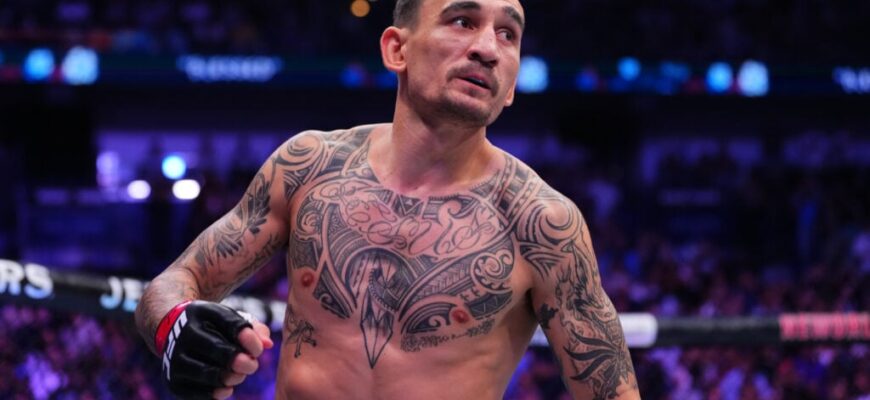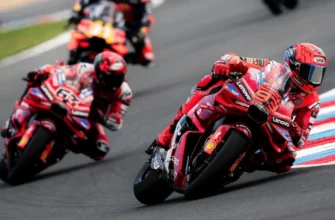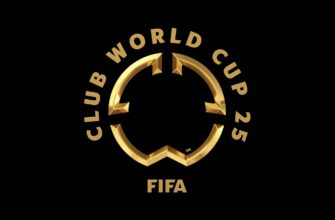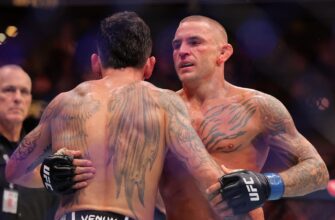“`html
In the high-stakes world of mixed martial arts, a fighter`s legacy is often defined not just by their victories, but also by the manner of their exit. Recent events have starkly highlighted this, pitting the contrasting retirement narratives of two prominent figures: the calculated, emotional farewell of Dustin Poirier at UFC 318 against the abrupt, somewhat perplexing pronouncements from Jon Jones.
Dustin Poirier`s Swan Song: A Masterclass in Farewell
Dustin “The Diamond” Poirier`s recent bout at UFC 318 was more than just another fight; it was a pre-announced, meticulously choreographed swansong. Fighting in his home state, Poirier`s final walk to the Octagon was steeped in palpable emotion, culminating in a performance that, while ending in defeat to Max Holloway, left fans with a sense of closure and admiration. His decision was public, his journey transparent, and the conclusion, despite the outcome, felt earned and authentic. This was a fighter saying goodbye on his own terms, surrounded by the adulation of a grateful fanbase. It demonstrated a poignant understanding of narrative and public sentiment, providing a dignified and memorable close to a storied career.
Jon Jones`s Peculiar Pause: A Conundrum for Fans
Conversely, Jon Jones`s recent “retirement” has been anything but clear-cut. Following months of speculation surrounding his heavyweight division future and debates over potential unification bouts with Tom Aspinall, Jones`s announcement came not as a grand declaration, but almost as an aside during a Dana White press conference. This understated, almost casual, delivery struck many fans as incongruous with the stature of a fighter widely considered among the greatest of all time. One might even suggest it was a curious choice for a man whose career has been anything but understated.
The swift backlash on social media was immediate and pointed. Fans, fresh from witnessing Poirier`s emotional exit, were quick to draw comparisons, criticizing Jones for what they perceived as a “lackluster” or even “disingenuous” departure. Comments ranged from accusations of a temporary “BS retirement” to demands for a more fitting farewell from a legend of his caliber. The general sentiment seemed to be that Jones had perhaps missed an opportunity to script a more compelling final act.
The Champion`s Defense: Legacy, Achievements, and Grand Visions
Ever the provocateur, Jon Jones was quick to address his detractors. He leveraged social media to remind critics of his unparalleled achievements: “My last fight I beat the greatest heavyweight of all time for a record-breaking 16 title wins. I did it in my home state at Madison Square Garden.” A robust defense, certainly, highlighting a career trajectory few could ever hope to replicate. It was a firm reminder that while the exit might be debated, the in-cage accomplishments are indisputable. Yet, it was his audacious vision for a potential return that truly captured attention.
Jones boldly claimed his next (and potentially final) fight would be “at the White House at the biggest event in the history of our sport.” A statement of remarkable ambition, suggesting a grand finale befitting his unparalleled career, pushing the boundaries of what`s conceivable in combat sports. One could almost hear the collective gasp of disbelief and intrigue from the MMA world.
Dana White`s Reality Check: Trust and the `White House Card`
However, the grandiosity of Jones`s vision met a stark reality check from none other than UFC CEO Dana White. In a post-UFC 318 press conference, White directly addressed the “White House” speculation, casting a long shadow over Jones`s ambitious plans. White`s comments revealed a deeper concern: a lack of trust in Jones`s reliability for such a high-profile, politically sensitive event.
“You know I can`t risk putting him in big positions in a big spot and have something go wrong – especially the White House card,” White stated bluntly. This isn`t merely about fight metrics or pay-per-view numbers; it speaks to the broader responsibility and public image that accompanies such a prestigious event. White`s words suggest that Jones`s past controversies and unpredictable behavior continue to weigh heavily on the organization`s willingness to grant him ultimate control over his narrative, especially on such a global stage. The irony, of course, is that a fighter of Jones`s caliber finds his biggest dream potentially scuttled not by an opponent, but by his own history.
The UFC, as a major sporting enterprise, must protect its brand and its relationships, particularly when venturing into unprecedented territories like a White House event. Jones`s history, unfortunately, presents a considerable risk factor that the promotion appears unwilling to gamble on for such a monumental occasion. It`s a calculated business decision, despite the undeniable star power Jones possesses.
The Unwritten Chapter: Jones`s Next Move and the Power of Perception
As Dustin Poirier steps into a well-deserved retirement, having seemingly mastered the art of the exit, Jon Jones finds himself at a fascinating crossroads. Will White`s candid assessment temper his aspirations, or will it fuel a different kind of comeback? The stark contrast between Poirier`s dignified departure and Jones`s more chaotic public relations dance underscores a vital aspect of a fighter`s legacy: it`s not solely about the belts won or the records broken. It`s also about the narrative they build, the respect they command, and the trust they foster – not just with fans, but with the very organization that facilitates their journey.
In the theater of combat sports, the final bow is as critical as the opening punch. While Poirier has delivered a compelling closing act, Jon Jones`s final chapter remains unwritten, and perhaps, subject to more external influence than he would prefer. The anticipation, however, is undeniable.
“`








